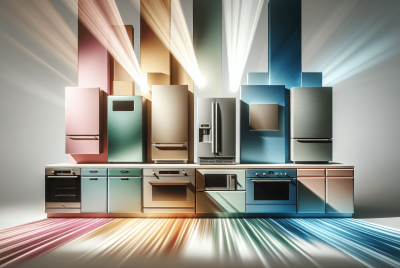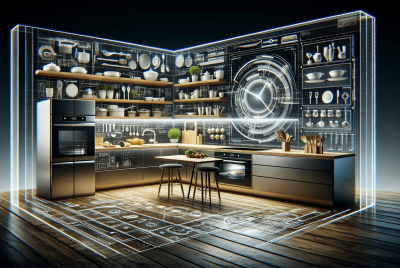What Are Major And Small Appliances?
Imagine walking into a kitchen filled with various appliances, from stovetops to refrigerators to blenders. It’s easy to get overwhelmed by the sheer number of options available. That’s why it’s important to understand the difference between major and small appliances. Major appliances, such as refrigerators and ovens, are essential for the smooth functioning of a household, while small appliances, like toasters and coffee makers, provide convenience and efficiency in our everyday lives. In this article, we’ll explore the distinctions between these two categories, helping you navigate the world of appliances with ease.

Major Appliances
Definition
Major appliances are large electrical or mechanical machines that are used for household tasks and are typically difficult to move. These appliances are crucial in performing essential functions in the home, such as cooking, cleaning, and refrigerating food. They are designed to handle heavy workloads and are built to last for several years.
Examples
Some common examples of major appliances include refrigerators, stoves, ovens, dishwashers, washing machines, and dryers. These appliances are essential for everyday activities and contribute greatly to the comfort and convenience of modern living.
Importance
Major appliances play a vital role in our daily lives by simplifying and automating various tasks. For instance, a refrigerator helps to keep food fresh, preventing spoilage and reducing waste. A dishwasher saves time and effort by washing and drying dishes, eliminating the need for manual labor. An oven and stove enable us to prepare delicious home-cooked meals efficiently.
Features
Major appliances come with a range of features and functionalities that enhance their performance and convenience. For instance, many refrigerators now include ice makers, water dispensers, and temperature control settings. Washing machines offer different wash cycles and load capacities to suit different fabric types and laundry sizes. Ovens often include advanced cooking options, such as convection or steam cooking.
Costs
The cost of major appliances can vary widely depending on the brand, size, features, and quality. High-end brands and models with advanced features may come at a higher price point, while more budget-friendly options are also available. Additionally, installation costs and any additional accessories or maintenance requirements should also be considered when budgeting for major appliances.
Energy Efficiency
With increasing concerns about energy consumption and environmental impact, energy efficiency has become an important factor to consider when choosing major appliances. Energy-efficient appliances use less electricity or gas, helping to reduce utility bills and minimize carbon emissions. Look for appliances labeled with the Energy Star logo, as these have been certified to meet specific energy-saving standards.
Brands
There are numerous brands available in the market offering a wide range of major appliances. Some popular and well-regarded brands include Samsung, LG, Whirlpool, KitchenAid, Bosch, and GE. It’s important to research and read reviews to determine which brand best fits your needs and preferences in terms of reliability, performance, and customer satisfaction.
Maintenance
Regular maintenance is essential to keep major appliances in optimal working condition. This includes cleaning, checking for any signs of wear and tear, and following manufacturer’s instructions for filter replacement, lubrication, or other maintenance tasks. Keeping appliances clean and well-maintained not only extends their lifespan but also ensures their efficient performance.
Repair
In the unfortunate event of a major appliance breakdown, repair becomes necessary. It is advisable to consult a professional appliance repair technician who is experienced in repairing specific brands and models. Attempting to repair appliances without proper knowledge and expertise can be dangerous and may lead to further damage. Many major appliance brands have authorized service centers where certified technicians can provide reliable repairs.
Considerations when buying
When buying major appliances, there are several factors to consider to make an informed decision. First, assess your needs and the available space in your home to determine the appropriate size and capacity of the appliance. Consider the features that are important to you and how they align with your lifestyle. Compare product reviews, warranties, and customer support offered by different brands. Lastly, evaluate the long-term costs, including energy efficiency, maintenance, and potential repair expenses, to choose an appliance that best fits your budget and requirements.
Small Appliances
Definition
Small appliances are compact electrical devices that are portable and designed to perform specific tasks. Unlike major appliances, they can be easily moved around and are typically used for smaller-scale activities or personal needs.
Examples
Small appliances encompass a wide range of devices with diverse functions. Some common examples include toasters, blenders, coffee makers, electric kettles, microwave ovens, vacuum cleaners, and hair dryers. These appliances are often used in the kitchen, personal grooming routines, or for cleaning purposes.
Importance
Small appliances provide convenience and efficiency in performing various daily tasks. They are designed to simplify specific processes and save time and effort. Small kitchen appliances, for example, enable quick food preparation or beverage making. Personal care appliances help individuals maintain their appearance and grooming routines effortlessly. Cleaning appliances streamline household chores, making them less time-consuming and physically demanding.
Features
Small appliances come with different features and functionalities tailored to their specific purposes. For instance, coffee makers may have programmable timers, adjustable brew strength, or automatic shut-off functions. Toasters may include options for different browning levels or a bagel setting. Vacuum cleaners may have different attachments or a built-in filtration system for enhanced cleaning performance.
Costs
The cost of small appliances varies depending on their brand, features, and quality. While some basic models can be affordable, others with advanced features or high-end brands may come at a higher price point. Consider your budget and the value you expect to derive from the appliance when making a purchasing decision. Additionally, factor in potential long-term costs, such as replacement parts or consumables required for maintenance.
Energy Efficiency
Similar to major appliances, energy efficiency is an important aspect to consider when choosing small appliances. Energy-efficient small appliances help reduce electricity consumption, ultimately saving money and minimizing environmental impact. Look for appliances with energy-saving features, such as low-power modes or auto-off functions, and check for energy efficiency labels or certifications.
Brands
Various brands specialize in producing high-quality small appliances. Some well-known brands include KitchenAid, Cuisinart, Breville, Dyson, Hoover, and Philips, among others. Researching and comparing brands allows you to make an informed decision based on factors like reputation, durability, performance, and customer satisfaction.
Maintenance
Regular maintenance enhances the longevity and performance of small appliances. This typically involves cleaning and removing any dirt or residue, checking for any signs of wear, and following the manufacturer’s instructions for filter replacement or other maintenance tasks. Keeping small appliances clean and in good condition ensures their efficient operation and extends their lifespan.
Repair
In case of a malfunction or breakdown, small appliances can often be repaired by following the manufacturer’s instructions or seeking professional assistance. Avoid attempting repairs without proper knowledge, as this may cause further damage or pose safety risks. Contact the manufacturer’s customer service or consult an authorized repair center to ensure reliable and safe repairs.
Considerations when buying
Consider your specific needs and preferences when buying small appliances. Evaluate the tasks you expect the appliance to perform and ensure it aligns with your desired features and functionalities. Assess the available space where the appliance will be used and stored. Read product reviews and compare warranties and customer support offered by different brands. Finally, consider ongoing costs, including energy efficiency, maintenance requirements, and the availability of replacement parts, to make a well-informed purchasing decision.




